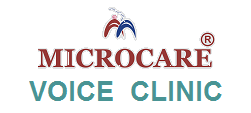How is a voice disorder diagnosed?
ENT Consultation:
The diagnosis is in conjunction with an endoscopic and video stroboscopic examination of the vocal cords, done by an ENT Surgeon or Otolaryngologist.
• A thorough history taking, to determine the exact nature and possible causes of the complaint
• Direct video Laryngoscope
• Flexible Laryngoscope – assessing the function of the vocal folds
• Laryngostroboscopy – Examining the vocal cords using a specialized flickering light source, called digital Laryngostroboscopy. This allows an assessment of the movement and vibration of the vocal cords. This is the best & latest instrument for early detection of vocal cord cancer.
• flexible fibreoptic nasopharyngoscope – Evaluation of the nasal cavity, palatal region, nasopharynx and oropharynx.
Voice Therapist Consultation:
The voice therapist plays an important role in the diagnosis and treatment of voice disorders. The voice therapist makes the diagnosis by the following means:
• Perceptual assessment
• Computerized voice analysis – Acoustic analysis or Analysis of the sound signal
• Spectrographic analysis
• Aerodynamic measurements – Analysis of airflow and air pressure during voice production
• Electromyography – Evaluation of muscle tone in the muscles used to produce voice
Discussion of difficult cases with international faculty
Following the diagnosis of the voice disorder by the ENT Surgeon or otolaryngologist and the voice therapist, the treatment options are discussed and decided upon. This may include surgery, voice therapy or a combination of both.
As can be seen, the voice therapist and the voice surgeon work in close coordination with each other and form the central figures in the large team which makes up a voice disorder clinic.
Other special tests may also be required for a complete evaluation of the voice disorder. Many times a voice problem has to be diagnosed and treated by a team of specialists like E.N.T Surgeon Voice therapist, Gastroenterologist, Endocrinologist, Neurophysician and Psychologist etc.
Various Treatment modalities in the management of voice problems
After the patient’s voice disorder has been diagnosed, various treatment options are offered to the patient by the voice surgeon and the voice therapist. These might include pharmacotherapy, voice therapy and phonosurgery
How Voice Problems can be corrected?
Voice problems can be corrected in two ways
- by voice therapy
- by voice surgery or phonosurgery
Audio Voice recording
Audio Voice Recording is the most important prerequisite for the voice quality assessment. The high quality audio recording remains as a document for performing additional tests or for reference to your voice before treatment. Your audio voice recording is considered as Voice Sample, a sampling frequency of at least 20,000 Hz is recommended.
Standard protocol for Audio Voice recording to take Voice Sample is
/A: / comfortable pitch/ loudness
/A: / at slighter loud pitch
A single sentence or a short standard passage
 Microcare Voice Clinic in Hyderabad
Microcare Voice Clinic in Hyderabad
